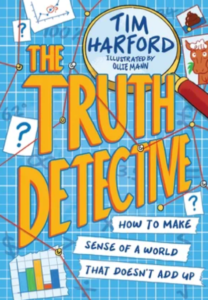Tim Harford (text) and Ollie Mann (illustrator), The Truth Detective, Hachette Australia, March 2023, 192 pp., RRP $22.99 (pbk), ISBN 9781526364579
Tim Harford is the author of nine books on economics and mathematics, and the presenter of a BBC podcast that has attracted Anthony Fauci and Bill Gates as guests. This is his first children’s book. It is aimed at children who want to learn how to find what is true when so much misleading information (or misleading data) is available to them. In a world of fake news, targeted advertising, biased reporting, conspiracy theories, and pressure from pundits and influencers on media platforms, what are the skills needed by a child who wants to know the truth?
It turns out that it’s possible for any (patient) child to acquire the necessary skills. You don’t even need to be particularly clever with numbers to understand how to interpret data — but you do need to take your time, always look around, ask questions, and be suspicious of your own immediate feelings and judgements, which can be so easily manipulated. The most attractive quality of this book is its willingness to admit that a something like, ‘What is a trustworthy source?’ is a big and difficult question. At the easier end of the spectrum, you might trust a comedian to know about human foibles, but you wouldn’t, or shouldn’t, trust a comedian to tell you whether COVID vaccines are safe to take. It can get a whole lot harder to know what information to trust when a ‘scientist’ begins to talk about climate change or the safety of vaping.
In ten absorbing chapters with many inspiring examples of good thinkers (Florence Nightingale was a pioneer in using pie charts to exhibit the different effects of different medical procedures), Tim Harford takes the interested child through lessons in when to trust numbers, when to trust your own perceptions, how to ask what’s missing from a picture, how to make the right comparisons when big numbers need to be appreciated, and finally and perhaps most importantly a chapter on maintaining your curiosity—even your curiosity about the thinking of people you disagree with.
Ollie Mann’s simple and attractive drawings throughout help to enliven the necessarily detailed text. When it gets into the hands of the right child at the right moment this book could be transformative. Teachers and parents too will find here the examples and the pithy explanations that will help them lead students towards clearer, more critical and more open-minded thinking
Reviewed by Kevin Brophy


